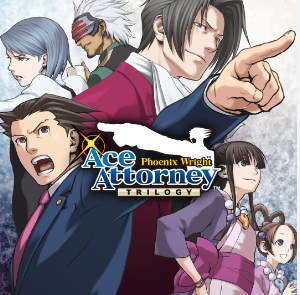Across gaming, there are a few titles which seem to have lasted the test of time. Doom has been getting ported to every cutting edge console since its release way back in 1993. The Just Dance franchise continued to release games even on the Wii until the turn of the decade in 2020. And today, we will talk about a game which has aged similarly gracefully. Rather, we will talk about a trilogy of such games as we delve into Phoenix Wright: Ace Attorney Trilogy. This title has been ported many, many times after originally launching in 2012, but today’s piece will talk about the version which launched in 2019 on PlayStation 4.
We usually delve into a simple list of right vs wrong. Today, we are talking about a trilogy, so let’s start off by analyzing each individual game.
Phoenix Wright: Ace Attorney

The first game of the trilogy, this entry easily had the most charm and wit out of the three. Court and law in general are very hard hitting, complicated subjects, and this game offers a lot of related terminology and concepts to the player in very noob-friendly ways. The player is seamlessly taught the meaning behind many niche but important things, such as cross-examination, testimony and much more…
However, as this is a video game, this game and its future entries cannot completely, seamlessly adapt real world court politics into a game. After all, real-life trials can take weeks, if not months, and entire cases can go years before they’re solved. In this game, everything happens within a three day period, which is outrageously unrealistic. To the game’s credit, it does attempt to quickly explain that this fictitious, half Japan/California hybrid has instituted a law mandating the completion of trials this expeditiously.
The lack of legal realism extends past going to trial. The concept of “innocent until proven guilty” would make these people laugh, both the defense and the prosecution. As the defense attorney, Phoenix Wright is frequently forced to prove his client’s innocence, typically simultaneously as he pins the guilt on someone else who is typically a witness at the stand. This sequence of events is so absurdly unlikely to ever happen that I would wager you’d sooner get struck by lightning sitting in court. Yet, it becomes the premise for each episode.
In spite of this, the stories being told are consistently brilliant. Script writing is perfect, between witty conversations had between characters and events taking place in the story. In some way, almost every recurring character in this game experiences a very satisfying arc that gives them a lot of depth. Detective Gumshoe begins as a pompous idiot who does little but berate and annoy Phoenix Wright. By the end of the first game, he is on much friendlier terms with Phoenix and even directly assists him in his own work. There are many examples of this we will discuss more later.
Phoenix Wright Ace Attorney: Justice For All

The sequel doesn’t quite have the same level of charm or amazing writing from the first game. But it otherwise performs almost the exact same. This time, new features are introduced that enhance gameplay in the middle of investigating, which takes place between trials. Psyche-Locks are the main attraction, giving more to do in between each trial day.
The same criticisms of lacking legal realism absolutely follow this game from the first entry. It gets a little more ridiculous here though, as a prosecuting attorney Phoenix faces off against a few times quite literally assaults Phoenix, and the judge himself, with a whip, a straight up weapon. She does this dozens of times with zero repercussions whatsoever. Other than that, the same legal realism fails from the first game are on display here.
We did get a few satisfying characters to interact with this season. At the top of the list by far would be the new attorney Franziska von Karma, another character who starts off being strictly hateable and ends with a satisfying, ambiguous arc.
Phoenix Wright Ace Attorney: Trials & Tribulations

Gameplay is almost the exact same as the previous two games, so there’s no significant difference in that regard. This time, our most notable new character is Godot, another new prosecuting attorney. He doesn’t assault his peers on the same level as Franziska von Karma, but he does literally throw a glass mug full of steaming hot coffee at Phoenix, so he isn’t doing too much better.
One thing this game did to try and stand out from the others in the trilogy is have the player play as someone new. In two episodes, we experience flashbacks where we play as Mia Fey from before she was murdered. Gameplay isn’t actually meaningfully different, but a fresh set of characters on a couple of occasions was neat to experience.
Ultimately, this game produced what is arguably the trilogy’s best overall episode, and its own finale, Bridge to the Turnabout. This episode tried a number of things that just flowed extremely well- it allowed the player to briefly play as Phoenix’s friend and rival Miles Edgeworth, which was really cool. It also had a genuinely thrilling narrative with an enthralling villain and several, and I do truly mean several, mind-blowing plot twists. This episode was magnificent, and it’s hard to have asked for a better way to close off the trilogy.
Overall Assessment (Good vs Bad)
Characters (Very Good) – There are so many excellently written characters in this game that are so easy to develop a long term interest in. Miles Edgeworth, Dick Gumshoe, Mia Fey and of course, the man himself in Phoenix Wright are some of the better characters I’ve seen in gaming in general. That is hardly a comprehensive list, however, and there really aren’t any characters across the trilogy which weren’t easy to enjoy and appreciate in some way.
Cases (Good) – While some of them are a little over the top as far as being complex, each case was obviously designed with extreme care and creativity. Almost all of them are highly convoluted murder trials where the player is meant to defend a client and, by the end, will also end up naming the true culprit as well. Following the logic behind every notable claim made is really interesting.
Interface During Trials (Good) – The act of offering positive reinforcement to the player is an easily overlooked art that this game absolutely nails. When the player correctly chooses a piece of evidence to present to the court, or they correctly press a witness on the right statement, the game’s soundtrack will abruptly come to a halt. Either “objection!” or “hold it!” will be heard, and the scenario will play out. It’s really funny seeing characters the player accuses of something suddenly unravel mentally when the player gets it right. The way it’s done is meant to reward the player massively, and it really comes through.
Legal Realism (Bad) – It’s understandable that some sacrifices had to be made to produce a somewhat legally accurate game that is also actually fun to play as a source of entertainment. In real life, procedures and general etiquette are so far off course from this game that it’s actually hysterical. In real life, every single one of these trials that happen in the game would get thrown out for a mistrial so fast that it might set legal history. The game’s many qualities definitely outshine this drawback. But it would be nice to see a game like this try a little bit harder to make a legally realistic game.
Blue Badger Minigame (Very Bad) – In episode five of the first game, Rising From Ashes, the player will eventually find themselves examining a broken jar. The player has to tilt and turn the jar so that it closely resembles that of a mascot with a badger head, appropriately named Blue Badger. Simply put, this minigame is awful. The game expects the player to have the jar emulate the head so closely, it will fail the player if they are so much as one tenth of a button press off. Given that this game came from an era where technology wasn’t particularly well developed to begin with, this mechanic and minigame has unfortunately only gotten worse as time has passed. What’s worse, a horrendous tune of Blue Badger’s theme song will endlessly play as the player continues to play this minigame. This tune will continue to play until they successfully pass the game. This will cause anyone with even a shred of sanity to mute their game, which is definitely not what you want to get from a source of entertainment.
Outdated Language – It’s difficult to fairly label this “bad.” After all, these games originally launched individually in the early 2000s. Mannerisms and slang were viewed in a very different way back then. Having said that, characters in this game, primarily the first two games, had a tendency to get really mean and say some pretty awful things to each other.
Viewer discretion is advised, but I offered some examples below.

The Overall Verdict
This game offers lots of charm, rigorous gameplay and a genuinely amazing overall cast of characters. Even if its brand of legal realism belongs on a funny farm, the game is able to make relatively jargon-y courtroom procedures and terms fun and enriching to engage with. Lacking in any serious flaws, this InReview finds the trilogy of Phoenix Wright: Ace Attorney…
GUILTY
…of being a great overall trilogy and receiving an A for a grade.





Leave a comment